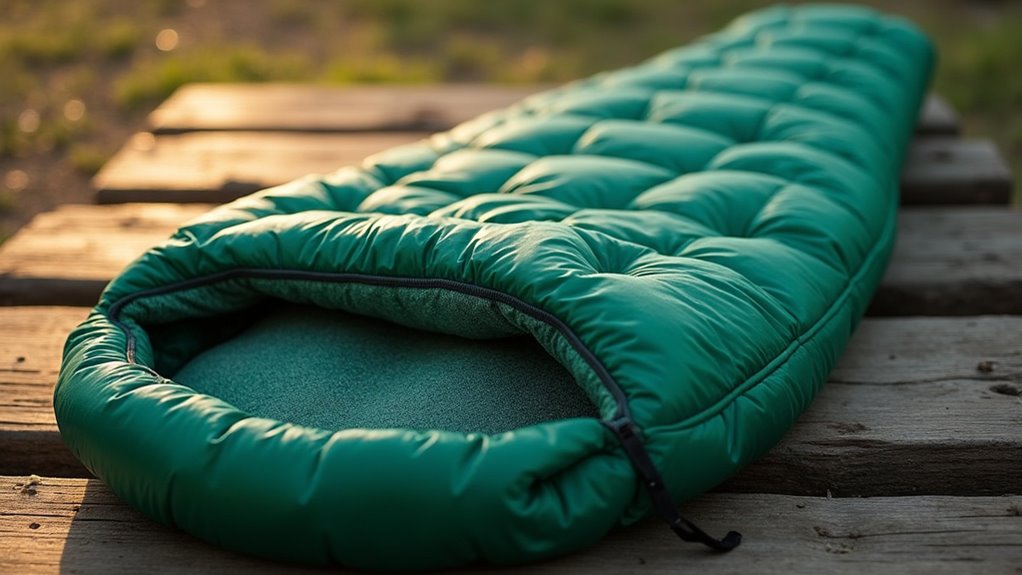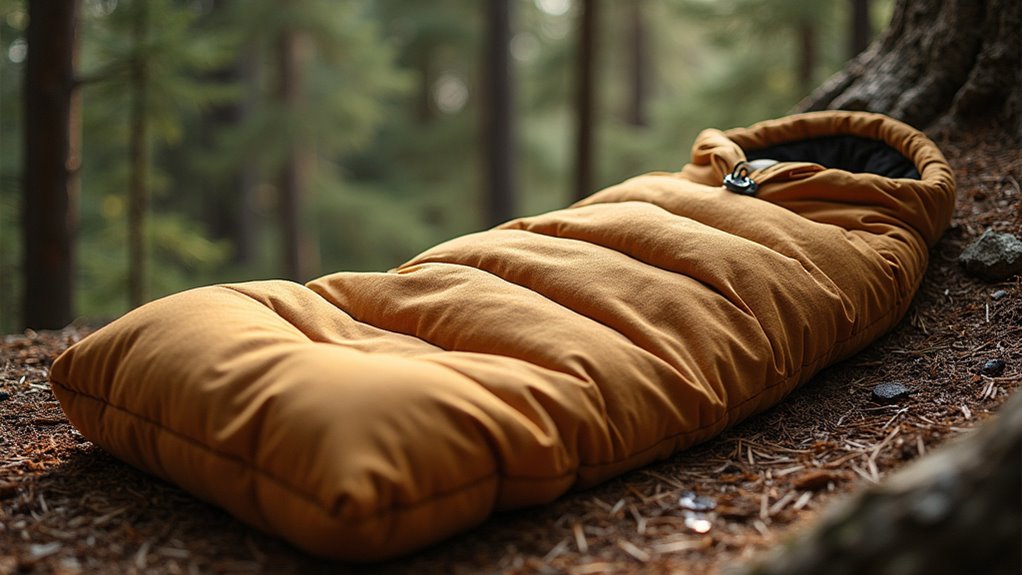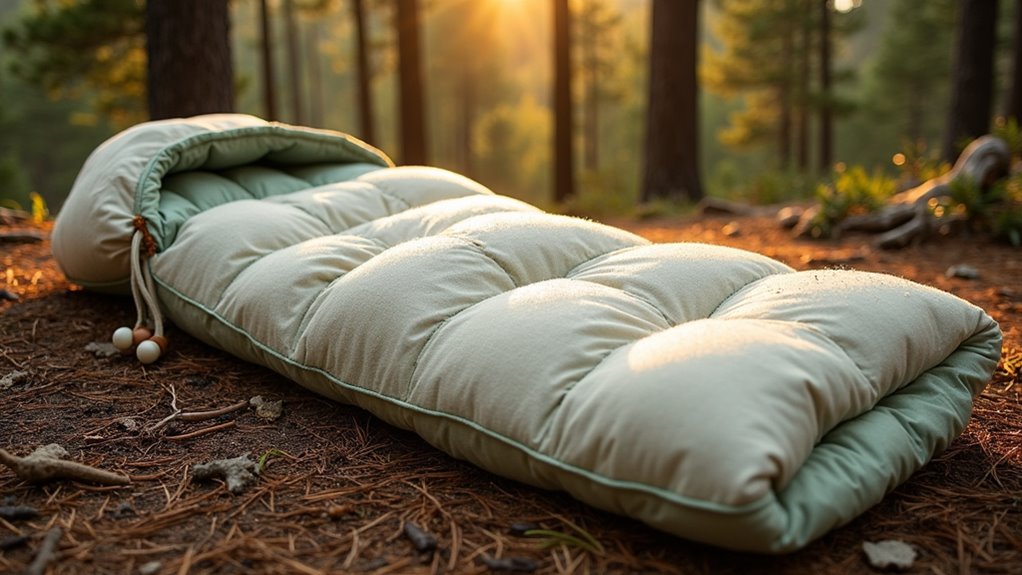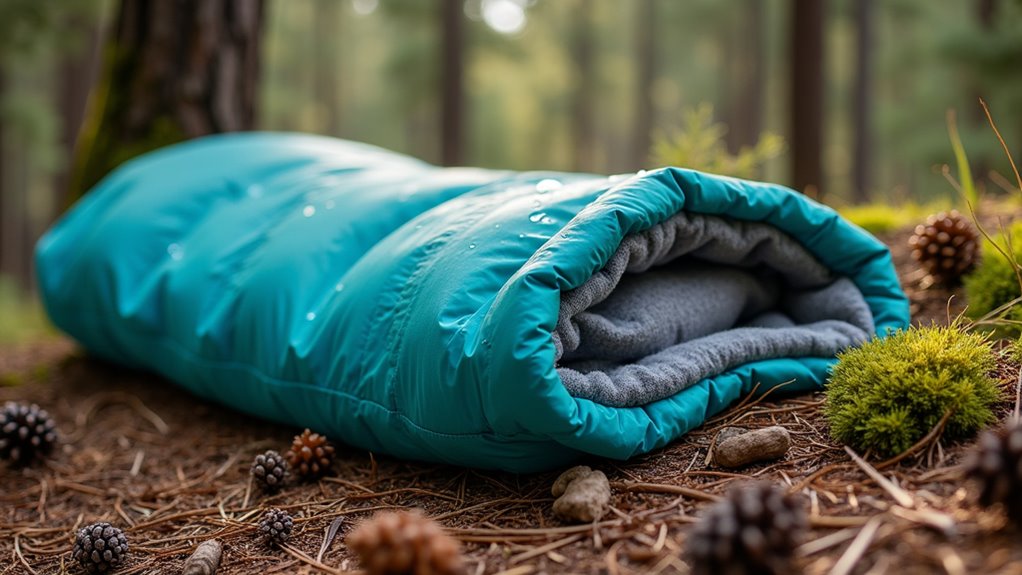Physical Address
304 North Cardinal St.
Dorchester Center, MA 02124
Physical Address
304 North Cardinal St.
Dorchester Center, MA 02124

Trade comfort for sustainability no more - these 8 eco-friendly sleeping bags prove you can have the best of both worlds.
You might think eco-friendly sleeping bags can’t match the performance of traditional options, but recent innovations have proven otherwise. When you’re planning your next outdoor adventure, you’ll find that sustainable materials like recycled down and organic cotton deliver exceptional warmth and comfort without compromising the environment. From budget-friendly basics to premium alternatives, today’s green camping gear offers practical solutions that’ll help you sleep soundly in more ways than one.

While traditional sleeping bags often rely on virgin materials and resource-intensive production methods, today’s eco-friendly options incorporate sustainable materials that reduce environmental impact without sacrificing performance.
You’ll find that hemp distinguishes itself as a water-efficient alternative to conventional cotton, while recycled materials form the backbone of many sustainable sleeping bags.
Look for models like RAB’s Solar Eco, which uses 100% recycled materials in its construction. For the liner and outer shell, organic cotton provides a natural, biodegradable option that’s gentle on your skin.
Many manufacturers now use recycled synthetic insulation, as seen in Mountain Hardwear’s Eco AF series, delivering warmth without new petroleum-based materials. The addition of moisture-wicking properties helps maintain optimal dryness throughout your camping experience.
Consider undyed fabric options, which save significant water by skipping the dyeing process while maintaining durability and functionality. Sustainable sleeping bags can also be found in recycled down varieties, providing a natural insulation option.
When it comes to sustainable sleeping bags, down-filled options lead the pack in warmth-to-weight performance.
You’ll find top contenders like the REI Co-op Magma, which features 850-fill-power goose down and multiple sustainability certifications. For a fully recycled option, consider Mountain Equipment’s Classic Eco sleeping bags, made with 100% recycled down and fabrics. For premium warmth retention, the 950-fill down utilized in Feathered Friends bags offers unmatched insulation performance while minimizing material usage.
If you’re watching your budget, the REI Co-op Down Time offers excellent value with its RDS-certified 650-fill-power duck down and bluesign-certified materials.
While these eco-conscious bags may cost more upfront, they’re built to last and offer superior insulation. Look for features like draft tubes, contoured hoods, and insulated yokes to maximize warmth retention.
Always check for RDS certification to guarantee ethical down sourcing.

For campers seeking healthier alternatives to conventional sleeping bags, chemical-free options provide safer sleep without harmful substances like PFAS and flame retardants.
You’ll find natural treatments like beeswax, pine resin, and jojoba oil that offer water resistance without synthetic chemicals. First-time adventurers can also benefit from these eco-friendly options.
Several manufacturers specialize in chemical-free sleeping bags. Lucky Sheep and Holy Lamb Organics craft bags using organic wool and cotton, while Rawganique focuses on hemp materials. Some bags offer impressive temperature ratings down to -5F.
Eco-conscious brands like Lucky Sheep, Holy Lamb Organics, and Rawganique lead the way in natural sleeping bags using organic fibers.
These natural options typically cost between $370 and $1,000, reflecting their premium materials and construction methods. While they’re more expensive than conventional bags, you’re investing in both environmental and personal health.
Look for materials like merino wool, organic cotton, and hemp, which provide warmth and breathability.
Consider silicone-coated options from brands like Wiggy’s if you need enhanced water resistance.
Modern backpackers need lightweight gear that aligns with eco-friendly values, and today’s market offers innovative solutions that won’t weigh down your pack or your conscience.
You’ll find excellent options like the Marmot Trestles Elite Eco, which combines synthetic fill with sustainable production practices at a reasonable price point. For premium performance, consider the REI Magma Trail Quilt with its water-resistant down and versatile design. The bag’s 850 fill power ensures exceptional warmth without excessive weight.
Both choices feature strategic baffling to maximize warmth while minimizing weight. Look for bags using recycled materials and RDS-certified down if you’re prioritizing sustainability. A camping fridge can be a valuable addition to your outdoor gear, providing a convenient way to keep food and drinks chilled during your adventures.
The Zpacks Classic with its Pertex Quantum fabric offers durability without excess weight. When shopping, check for eco-friendly packaging and ethical supply chain certifications to guarantee your purchase supports environmental conservation efforts.

Natural fiber sleeping bags offer a pure, chemical-free alternative to synthetic options while delivering exceptional comfort and performance.
Experience the purity of nature with sleeping bags crafted from natural fibers, offering both comfort and performance without synthetic additives.
You’ll find options made from hemp, wool, and organic cotton, each providing unique benefits for your outdoor adventures. These premium bags, like those made with domestically sourced wool, ensure sustainable and ethical production practices.
Hemp and wool-filled bags excel at moisture-wicking and temperature regulation, keeping you dry and comfortable throughout the night. They’re naturally resistant to odors and microbes, which means less maintenance and longer use between washes.
If you’re sensitive to chemicals or allergens, you’ll appreciate that these bags are free from VOCs and off-gassing. Plus, eco-friendly camping equipment can help minimize your environmental impact during your outdoor adventures.
While they might cost more upfront, their durability and low maintenance requirements make them a smart long-term investment for environmentally conscious campers.
When choosing an eco-friendly sleeping bag, understanding ethical manufacturing and fair trade standards helps you make responsible purchasing decisions.
Look for certifications like OEKO-TEX and Bluesign, which guarantee your sleeping bag is free from harmful substances and made through responsible practices.
Check for the Responsible Down Standard (RDS) or Global Traceable Down Standard (TDS) if you’re considering down-filled bags. These certifications assure ethical sourcing of materials and proper treatment of animals.
For a more affordable option, consider sleeping bags with synthetic fills made from recycled materials. Synthetic fills are especially beneficial as they provide better moisture handling in wet conditions.
You’ll also want to verify Fair Trade certification, which guarantees workers receive fair wages and work in safe conditions.
Companies with transparent supply chains often provide information about their manufacturing processes, helping you make informed decisions while staying within your budget.

Innovative recycling technologies have revolutionized how manufacturers create eco-friendly sleeping bags, giving you more sustainable options than ever before.
You’ll find sleeping bags made with recycled fabrics, including those using mono-materials that are easier to break down and reuse. Companies like NEMO are leading the way with their Endless Promise series, featuring 100% recycled materials.
The Marmot Trestles Elite Eco 20 exemplifies this sustainable innovation, offering premium comfort while utilizing recycled materials throughout its construction. Plus, essential camping gear is crucial for your next adventure, ensuring you have the necessary equipment for a successful and enjoyable trip.
Look for sleeping bags with traceable, recyclable down insulation through partnerships with suppliers like Allied Down.
Many manufacturers now offer take-back programs, allowing you to return your old gear for recycling when it’s time for replacement. This closed-loop system guarantees your sleeping bag won’t end up in a landfill.
You’re not just buying gear – you’re investing in sustainable practices that protect the environment.
The long-term environmental benefits of eco-friendly sleeping bags extend far beyond their initial manufacturing process. By choosing durable options with quality construction and proper maintenance, you’ll greatly reduce waste and the need for frequent replacements. Following the leave no trace philosophy ensures your sleeping bag choices align with responsible outdoor practices.
Opt for sleeping bags with reinforced stitching and abrasion-resistant fabric to guarantee multiple seasons of reliable use. Select biodegradable materials like wool or certified down that’ll break down naturally at disposal. Look for OEKO-TEX certified products to avoid harmful substances that could damage ecosystems. Consider synthetic fills made from recycled polyester for better moisture handling and longevity in damp conditions. Essential gear for your next camping adventure can further enhance the durability and sustainability of your sleeping bag.
Store and maintain your sleeping bag properly to preserve insulation properties and extend its functional life. These choices help minimize environmental impact while maximizing your investment in sustainable outdoor gear.
Pack purposefully by choosing conscious camping gear that won’t compromise your comfort or the planet. You’ll find fantastic eco-friendly sleeping bags fitting every budget, from recycled down designs to sustainable synthetic options. Smart shoppers can save money while supporting sustainable practices – just look for reliable ratings and respected certifications. Your mindful choice today helps preserve pristine wilderness for tomorrow’s adventures.